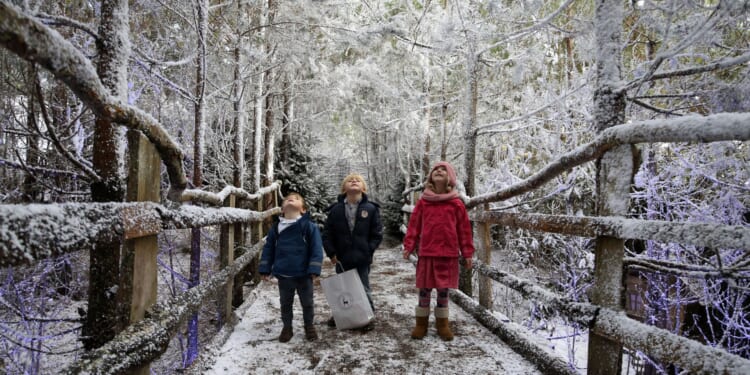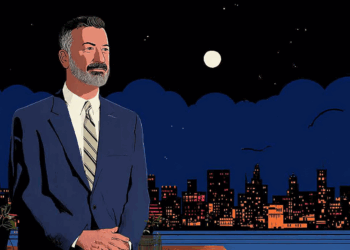The governance of Washington, D.C., has always been an experiment in coexistence.
This 61-square-mile plot of land is the nation’s capital, home to the White House and Congress, federal agencies, and numerous monuments. It’s also a major U.S. metropolis in its own right, with a population larger than the states of Wyoming and Vermont. The Constitution gives Congress legislative authority over the district’s governance. But since the 1970s, the city has elected its own mayor and city council, and, over the years, residents have pushed for greater local control and representation. In 2021, a bill granting the district statehood passed the U.S. House of Representatives.
Four years later, the question of Washington’s self-determination has moved sharply in the opposite direction.
Why We Wrote This
President Donald Trump’s takeover of the D.C. police department and deployment of the National Guard has opened a new chapter in the district’s relationship with the federal government. Critics warn the president may try similar actions in other Democratic-controlled cities. But Washington holds a unique status.
President Donald Trump’s announcement on Monday that he is temporarily placing the D.C. police department under federal control and deploying the National Guard to the nation’s capital to combat crime has opened a new chapter in the district’s relationship with the federal government. The move comes after Mr. Trump repeatedly threatened a federal takeover of the nation’s capital while on the campaign trail and again several times this year.
“Our capital city has been overtaken by violent gangs and bloodthirsty criminals, roving mobs of wild youth, drugged-out maniacs, and homeless people, and we’re not going to let it happen anymore,” said Mr. Trump in the White House briefing room, flanked by members of his administration. “This is Liberation Day in D.C., and we’re going to take our capital back.”
Violent crime surged in Washington during the pandemic. But it is now at a 30-year low, according to the Metropolitan Police Department, down 26% from this time last year. Those statistics, along with the June deployment of National Guard troops to Los Angeles amid modest immigration protests, have led Democrats to accuse the president of laying the groundwork for a federal takeover of Democratic-controlled cities. Mr. Trump himself appeared to suggest as much at his Monday news conference, calling his actions in Washington a “model” for other cities such as Chicago, New York, Baltimore, Los Angeles, and Oakland, California.
“Trump’s raw authoritarian power grab in D.C. is part of a growing national crisis,” Democratic Sen. Chris Van Hollen of Maryland wrote on X. “He’s playing dictator in our nation’s capital as a dress rehearsal as he pushes democracy to the brink.”
Yet the District of Columbia is also a unique place, with a tangle of laws giving different bodies overlapping authority on various issues. The Constitution clearly states that the seat of the nation’s government should be under federal jurisdiction. But the question of who handles the city’s day-to-day affairs – from overseeing schools to collecting trash to combating crime and homelessness – has never been simple.
How the city is governed, and by whom, has shifted through different eras, reflecting an ongoing push-and-pull between city officials and the political party in power.
“The Founders did see this as a conflict, as a problem to be solved,” says George Derek Musgrove, a history professor at the University of Maryland Baltimore County who has authored a book on the city’s history. “The problem is that they never solved it.”
National Guard troops deployed
This week, 800 D.C. National Guard troops will fan out across the nation’s capital, Mr. Trump said on Monday. U.S. Attorney General Pam Bondi will oversee the Metropolitan Police Department, with Drug Enforcement Agency Administrator Terry Cole stepping in as the department’s interim commissioner.
All of this is permitted under the city’s current governance structure. Even as Mr. Trump’s deployment of the National Guard to Los Angeles was being contested in a California courtroom on Monday morning, the president is unlikely to face the same legal pushback here. For one thing, the D.C. National Guard falls under the president’s authority. And under the 1973 Home Rule Act, the president has the authority to take over the D.C. police for 30 days. (After that, Congress would have to pass legislation granting an extension – which is unlikely, given Republicans’ lack of a filibuster-proof margin in the Senate.)
This section of the Home Rule Act, which was intended as an emergency measure in the event of widespread rioting, has never been invoked in the law’s 52-year history.
“It’s hard to find a historical analogy of what Trump is doing, because the whole premise … is completely false,” says Mary Dudziak, an expert in legal history at the Emory University School of Law. “He says that National Guard troops are needed because of the crime rate rising in Washington, D.C. And the data on the crime rate in Washington, D.C., is the opposite.”
But while crime in the district has fallen, those improvements have come on the heels of a dangerous few years – and what many residents perceived as a weak response from the city government.
In June 2020, a few weeks after George Floyd was killed by a white police officer in Minneapolis, the D.C. City Council unanimously approved emergency legislation limiting the use of force by D.C. police. It included requiring officers to release body-camera footage more quickly, limiting the role of the police union in disciplinary procedures, and barring officers from using tear gas or pepper spray to disperse a crowd. By 2023, Washington was one of the deadliest cities in the country, with violent crime up by 39%, though still far below the city’s murder rates in the early 1990s.
When the City Council attempted to rewrite the D.C. criminal code in 2023, including relaxing the maximum sentences for several violent crimes, the bill was blocked by Congress. Thirty-three Senate Democrats joined with Republicans to shut it down.
The following year, the Council reversed many of the provisions it had passed in the wake of Mr. Floyd’s death. The 2024 Secure D.C. Act relaxed policies around neck restraints (including the technique used by the officer responsible for Mr. Floyd’s death), allowed officers to review their body-camera footage before writing police reports, and cracked down on certain crimes like carjacking.
While Washington’s homicide rate fell in 2024, it remained higher than in other major cities such as Chicago, New York, Philadelphia, and Atlanta. A recent case of a D.C. police commander put on leave for allegedly falsifying crime data has bolstered the Trump administration’s claim that the city is more dangerous than official figures suggest.
As recently as this past May, a Washington Post poll found that D.C. residents ranked “crime, violence, and guns” as the biggest problem facing the city, above the economy, Mr. Trump, or housing.
Mr. Trump’s announcement came after a recent attack on a young Department of Government Efficiency employee, Edward Coristine, during an attempted carjacking.
The moves also appear to reflect the president’s own frustration with homeless encampments. He posted several photos of tents and trash on social media, pictures apparently taken from his motorcade while he was being driven to his golf club in Virginia over the weekend. Mr. Trump told members of the media that it was “embarrassing” how “dirty and disgusting” Washington has become.
Decrying violence, but not on Jan. 6
Many Democrats and local residents have pointed out the irony of Mr. Trump’s focus on D.C. violence, given that the attack on the U.S. Capitol by the president’s supporters on Jan. 6, 2021, remains one of the city’s most violent days in modern history. On his first day back in office, Mr. Trump pardoned some 1,500 defendants who participated in that day’s attack, including people convicted of violently assaulting police officers as well as organizers convicted of seditious conspiracy.
Those frustrated with the president’s show of force in the district have also suggested that if the city’s condition is a concern, reinstating the $1.1 billion that Congress cut from the city’s budget during a spending freeze – which the Senate has voted to restore but has stalled in the House of Representatives – should be a priority. Such funds are particularly needed, city officials say, at a time when Washington’s largest employer, the federal government, has issued mass layoffs.
Mr. Trump likely sees this moment as a political opportunity. His legal authority over the city’s police department will last only for 30 days, but leaning into the politics of crime – which continues to be Mr. Trump’s best polling issue – could be particularly useful following a weak July jobs report and ongoing criticism of his handling of the Jeffrey Epstein case.
As Mr. Trump noted several times during his news conference, the White House briefing room was standing room only.
But with ownership of a problem comes risk. Mr. Trump will now be judged by his ability to clean up the city “real quick,” as he put it, which might be more difficult than his administration predicts, given the city’s patchwork of jurisdictions and laws that change between traffic circles and sidewalks.
After the president created the D.C. Safe and Beautiful Task Force by executive order in March, which included a “surge” of law enforcement in public areas, the U.S. Park Police has made several arrests for marijuana usage in places like Dupont Circle and Logan Circle. Marijuana possession is legal within the city, but it is prohibited in the almost one-third of the city that is federally owned land, like its rotary parks.
“I think they’re using [crime] as an opportunity to try and put more federalized control in the executive on the ground here in D.C.,” says Alex Hawkins, a D.C. resident, while waiting for the metro at Dupont Circle. “They’re trying to make a point, a political point, that they control what’s going on in D.C.”













